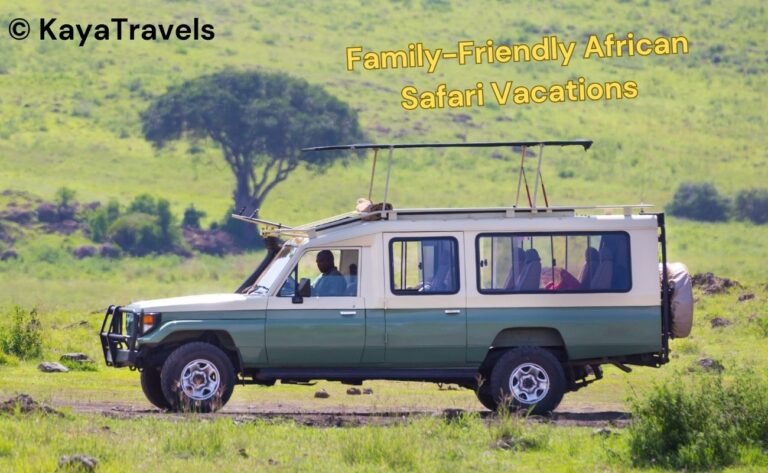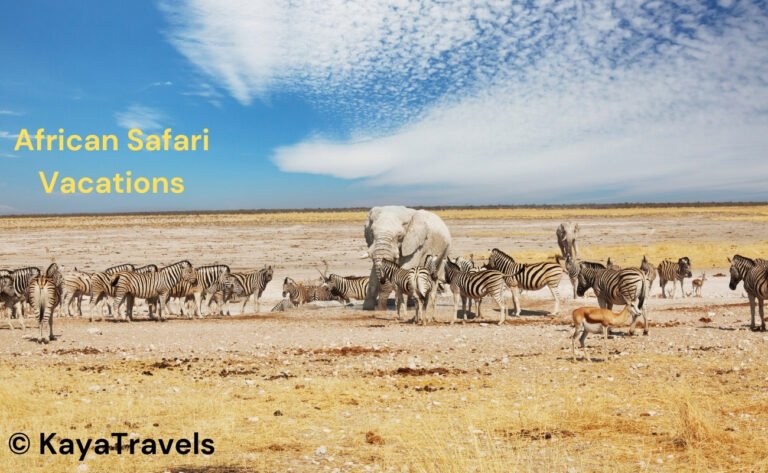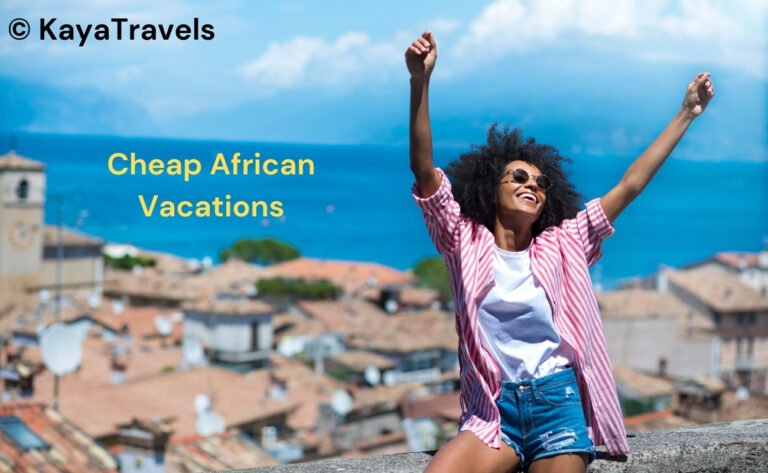If you’ve ever found yourself mesmerised by stunning images of vivid landscapes, incredible wildlife, and enchanting cultures of Africa, you’ve likely considered embarking on an African safari. But one glance at the price can quickly turn your dream into a seemingly unreachable fantasy. You may have asked yourself, “Why are African safaris so expensive?”
Exploring the African wilderness is more than just a holiday; it’s a once-in-a-lifetime experience. However, the cost can be a hefty quantity. The question is – are these costs justified?
Let’s delve into the factors that drive up the ticket prices for this premium experience and discover why each penny spent can be fully justified.
How is the price of an African safari calculated?
| Price Determinants | Description |
| Country | The specific destination within Africa. South Africa, for instance, tends to be a pricier safari destination. |
| Parks Visited | The type and number of national parks or reserves visited can influence the price of a safari. |
| Tour Type | Whether private or group tours, private tours are usually more expensive than group tours. |
| Season | The time of year of the safari. Peak season rates may be double the price of off-peak rates. |
| Accommodation | The type and luxury level of accommodation booked during the safari. |
| Transportation | The type of transportation (e.g. fly-in safari vs drive-in safari), including the number of domestic flights required. |
| Additional Costs | Include service fees, tips, and park fees. For instance, park fees in Tanzania are similar to those in Kethose in Kenya. |
What factors contribute to the cost of an African safari?
Many variables can influence the price you’ll ultimately pay for an African Safari. From the country of your travel to the parks you decide to visit can all change the cost. Notably, whether you opt for a private or group tour will also play a role in determining the amount you pay. Here’s a deep dive into some of these factors:
Choice of Country
Did you know that your safari destination impacts your safari’s budget significantly? For example, South Africa is known to be a more costly safari destination. In the same vein, regions like Kenya and Tanzania in East Africa also have their fair share of safari costs. Fees, services, and accommodations vary from country to country, making this an essential consideration.
Seasonality
The time of year you choose for your safari can affect its time. Safari costs in Tanzania and other African countries can fluctuate depending on the season. Peak in-demand periods like the Great Migration in East Africa tend to be more extreme off-peak seasons.
Type of Tour
The nature of your tour – whether private or group, can also affect the safari cost. Private tours, offering a more personalised experience, generally cost significantly more than group tours.
Accommodation and Transportation
The choice of accommodation and mode of transport could result in a price swing. Luxury accommodations will undoubtedly add to the cost, as will opting for a fly-in safari over a drive-in option.
Beyond these factors, other elements of an African safari cost include the cost of international and internal flights, visa costs, vaccination costs, travel insurance, and any additional accommodation before or after the tour. While African safaris can be quite an investment, the awe-inspiring experience you gain could justify every penny you spend.
How can I budget for an African safari?
| Expenses | Potential cost per person (in USD) |
| Flights (international and domestic) | $1000 – $2000 |
| Accommodation | $150 – $900 per night |
| Meals and Drinks | $30 – $100 per day |
| Park Entrance Fees | $20 – $80 per day |
| Guide and Service Fees | $10 – $50 per day |
| Travel Insurance | $50 – $200 |
| Vaccinations and Medication | $50 – $500 |
| Souvenirs and Personal Expenses | Variable |
Why is wildlife conservation a factor in the cost of African safaris?
Wildlife conservation is a crucial aspect that significantly impacts the cost of your African safari. You may be wondering how so. Let’s delve into the matter.
Firstly, most safari lodges and parks are heavily invested in wildlife conservation efforts. These undertakings are far from cheap, involving everything from anti-poaching efforts, wildlife research, regular vet care and rehabilitation for injured animals to local community engagement.
In other words, when you pay for a safari, a portion of your spending is channelled directly towards these essential wildlife protection efforts. It’s a way for you to contribute towards ensuring the sustainability of these stunning wildlife habitats for future generations to appreciate and marvel at.
Moreover, the park fees, usually included in your safari cost, directly support these conservation efforts. These fees are an essential funding source, without which many parks and reserves would struggle to maintain their operations.
Even private conservancies, typically priced higher than public parks, often implement low-impact policies with higher bed-night charges to limit the number of guests. This, in turn, ensures a reduced environmental footprint and a greater focus on conservation initiatives.
Thus, while the cost of joining an African safari might seem steep at first glance, understanding where this money goes can provide some reassurance. Not only are you paying for an incredible adventure, but you’re also positively impacting wildlife conservation.
How do exchange rates affect the cost of an African safari?
Given the global nature of the travel industry, exchange rates inevitably play a critical role in determining the cost of your African safari. Most African safari costs are quoted in US dollars, making your home currency’s strength or weakness against the dollar a significant factor. Your currency may either work to your advantage or add to the cost.
Why so? For instance, if the value of your home currency drops against the US dollar, you could end up paying more for your safari than you originally planned. Conversely, if your currency strengthens, you may find that your budget goes a bit further. This is a particularly pertinent point for travellers from countries with currencies that fluctuate widely, such as the South African Rand or the British Pound.
Africa’s inflation rates and rising fuel costs, which increased the overall travel costs to popular safari destinations by about 12% last year, are also reflected in exchange rates. This economic reality further impacts the overall cost of your safari.
In conclusion, when planning your African safari, it’s crucial to keep a close eye on current exchange rates and economic forecasts for both your home country and the African country you plan to visit. This will help you anticipate potential cost fluctuations and budget more accurately for your trip.
Why is accommodation often expensive on an African safari?
Memorable encounters with wildlife may be a significant draw to Africa’s safari experience, but where you lay your head to rest at the end of the day plays a vital role in your safari trip and its cost. More often than not, accommodation on an African safari is a significant part of your trip expense.
High-end safari lodges and camps offer a luxury safari experience that often includes breathtaking bush views, private plunge pools and exquisite dining. These opulent lodges, providing personalised and unique experiences, usually start from a few hundred dollars and can rise to over $3000 per person per night. The price points reflect the level of luxury and service and the exclusive, often isolated locations of these lodges.
Remember, keeping the accommodation running in the remote wilderness is no easy task. It requires logistic planning for supplies, dealing with routine maintenance, and handling unexpected challenges. Many safari lodges are in a vast wilderness, so these tasks must be dealt with in isolated and challenging transportation scenarios. These are all significant factors contributing to the high operating costs of safari lodges and camps.
Also, most safari lodges are required by law to pay high conservation fees to the local government, which helps with wildlife preservation and conservation efforts. Still, these high taxes also contribute to the high cost of your accommodation.
However, you can find more budget-friendly accommodations if you’re prepared to forgo some luxury facilities. These include basic campsites and guest houses, which will likely form a more significant part of your experience as you will be ‘closer’ to the wilderness, but with the essential amenities provided to ensure your comfort. This way, you can save money without missing out on the safari experience of exploring Africa’s wildlife in its natural habitat.
Are there cheaper alternatives to traditional African safaris?
| Destination | Cost Range | Advantages |
|---|---|---|
| South Africa | Budget-friendly to High-end | Affordable luxury experiences a variety of wildlife, Priced in South African rand |
| Namibia | Budget-friendly to Mid-range | Affordable destination, Unique desert safari experiences |
| Indirect Flight Packages | Budget-friendly | Cheaper than direct flights, Ideal for travellers with flexible schedules |
| Recommended Accommodations by Tour Companies | Budget-friendly to Mid-range | Value for money, Convenience of bundled services |
| Air Ambulance Insurance Packages | Budget-friendly to High-end | Saves on medical emergency costs in the bush |
What is the average cost of a luxury African safari?
The average cost of an African safari is between $800 and $1000 per person per night
| Country | Low-End Rates (per person/night) | Mid-range rates (per person/night) | High-End Rates (per person/night) |
| South Africa | Below US $900 | US $500 – US $700 | US $750 – US $2,000 |
| Botswana | US $550 – US $600 (Green Season) | US $1,000 – US $2,500 | Average trip cost of US $23,577 |
| Kenya & Tanzania | N/A | US $450 – US $2,800 | N/A |
How much should I expect to pay for flights to and within Africa for a safari?
The cost of flights to Africa depends heavily on the destination country, departure location, and time of year. For instance, flights from London to popular safari locations such as Nairobi, Kenya or Johannesburg, South Africa, tend to range between £400 and £700. It’s important to note that these are just average prices and may swing significantly during peak safari or holiday seasons.
Internal flights within Africa, necessary for reaching some remote game reserves and safari parks, can contribute to the overall cost. For instance, a flight from Nairobi to Maasai Mara might set you back somewhere in the region of $200-$300 return. Considering at least two internal flights for your safari experience is a good rule of thumb when budgeting for your trip.
Consider booking flights well in advance or during off-peak times to save on airfare. Many airlines offer deals and discounts year-round, so watching for these can help reduce costs. It’s also worth checking if any special packages combine flights with accommodation and safari tours. Such a bundled deal might be more economical and provide the added advantage of streamlining the planning process.
In summary, a substantial portion of your safari cost goes into international and intra-continental airfare. Hence, keeping a tap on evolving airfare trends and being smart about booking flights can go a long way in managing your safari budget effectively.
How do guide and service fees affect the cost of an African safari?
It’s important to consider that guide and service fees can significantly influence the total cost of your African safari. The guides who navigate you through the breathtaking landscapes and facilitate your encounters with awe-inspiring wildlife are experienced professionals possessing a wealth of knowledge about the local biodiversity. These individuals are usually adept at spotting elusive wildlife and deeply understand animal behaviour patterns, ensuring you have the most rewarding experience possible.
Besides, these guides also provide insight into the specific customs and cultures of the region, promoting understanding and respect for local traditions. Their professional service is invaluable to making your safari memorable, and their fees reflect the level of expertise they bring. Though cutting costs in this area may be tempting, remember that engaging with a skilled guide can significantly enhance your safari experience.
Service fees, on the other hand, would often cover the cost of logistics such as arranging accommodation, preparing meals, and addressing any unexpected issues that may arise during the safari. Furthermore, they usually cover contributions to local community projects or conservation efforts, adding another layer to the total cost.
In some cases, these fees can fluctuate depending on your safari itinerary. For instance, if your journey involves passing through multiple national parks, additional park entry fees might be included in the service charge. It’s therefore essential to discuss these aspects with your tour operator before booking to ensure you have full transparency of costs.
Why is travel insurance important for an African safari, and how much does it cost?
Travel insurance plays a vital role in your safari adventure, adding not only peace of mind but also an essential layer of protection against various unforeseen circumstances. We might wonder, ‘Why is travel insurance important for an African safari?’
Imagine being in the wild, possibly hours away from the nearest healthcare facility. What if an unfortunate incident occurs? An accident, sudden illness, or even an emergency evacuation? Handling these situations in a remote location like the African plains can be challenging and incredibly costly.
This is where travel insurance shines. It covers unexpected medical expenses, flight cancellations, lost luggage, and other travel hiccups. A typical policy might also cover personal liability, offering financial support if you were to injure someone or damage property accidentally.
But then, ‘How much does this vital piece cost?’ you may wonder. Providing a definitive answer can be challenging, as travel insurance varies dramatically based on your age, coverage level, duration of your stay, and more. But as a rough guide, expect to pay anywhere from 4% to 10% of your pre-paid, non-refundable trip cost. So, for a safari extravaganza costing you £2,500, your travel insurance could be anything from £100 to £250.
Remember, the cheapest policy is not always the best. Be sure to scrutinise what’s covered—and what’s not—to ensure you select the most suitable plan for your needs.
While travel insurance does add to your safari expenses, it’s a small price to pay for the reassurance it offers. It means you can focus on enjoying the adventure of a lifetime without any worry hanging over your head.



